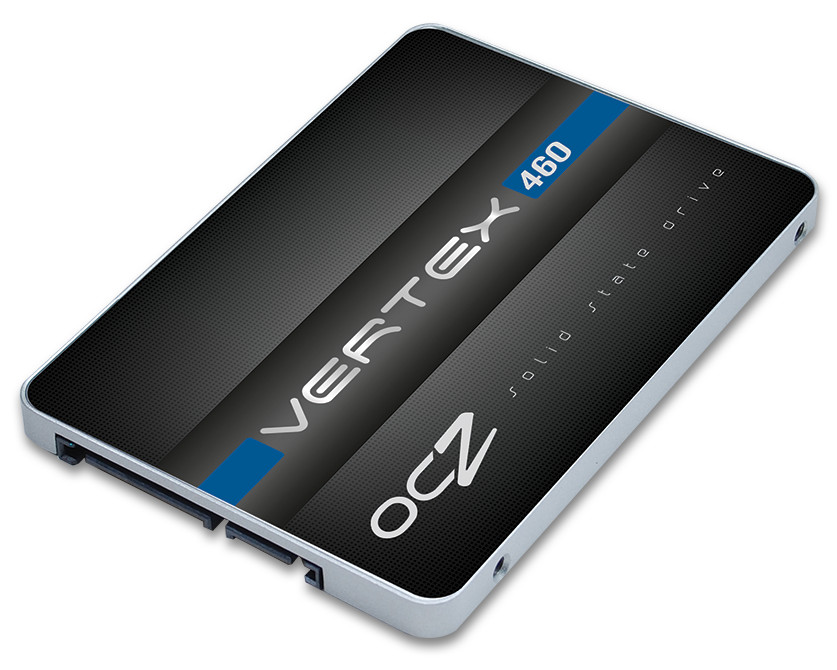OCZ Storage Solutions Intros the Vertex 460 Series SSDs
OCZ Storage Solutions has announced a new lineup of SSDs.
Get Tom's Hardware's best news and in-depth reviews, straight to your inbox.
You are now subscribed
Your newsletter sign-up was successful
OCZ Storage Solutions, which is now a subsidiary of Toshiba, has announced the Vertex 460 series SSDs.
The SSDs will feature Toshiba's 19 nm MLC NAND flash memory, as well as OCZ's Barefoot 3 M10 controller. This controller allows the unit to be encrypted using AES-256-bit encryption without losing performance.
The combination of this allows the Vertex 460 SSDs to read sequentially at up to 545 MB/s and write sequentially at up to 525 MB/s. It can push up to 95,000 and 90,000 random read/write IOPS, respectively, while it can sustain 23,000 IOPS during sustained 4K random writing.
The 2.5” 7 mm thick SSDs will be available in capacities ranging from 120 GB to 480 GB, though there is no word on pricing for these yet.
Get Tom's Hardware's best news and in-depth reviews, straight to your inbox.
Niels Broekhuijsen is a Contributing Writer for Tom's Hardware US. He reviews cases, water cooling and pc builds.
-
teachmehowtotank I have a vertex 4 in my laptop, have had no reliability problems with it. Even though I personally have had no problems does not mean they are good. They need to improve their reputation of building reliable ssd's. They are known to have some of the worst reliability in the business.Their speed is very good.Reply -
soldier44 Still using my Vertex 4 for year and a half now still getting around 500 read/write speeds. Not worth upgrading to at the moment.Reply -
danwat1234 I'm waiting to see what the consumer level Sandforce 3000 series controllers can do for SATA 3 IOPS. But of course all these SSDs are faster than necessary, will probably buy my next SSD used.Reply -
10tacle ReplyBut of course all these SSDs are faster than necessary, will probably buy my next SSD used.
1) Speak for yourself on how fast *you* think *your* SSD speeds need to be. 2) Buying an SSD "used' doesn't exactly sound like the smartest thing. -
danwat1234 For a desktop user, even one with high demands, a sandforce 2, or the latest indilinx, marvel or intel controller all provide great performance. I'd say 20% difference in performance between them and the only area to really improve on for SATA 3 would be small queue depth 4K transfer speeds.The difference in speed with using my old X25-M G2 80GB and the latest top end SATA3 SSD would probably only shave a few seconds off boot time or time to install windows updates, etc.Reply
Of course for file transfers and sequential write intensive activities the new SSD would be much faster. But comparing early high end SATA 3 to the latest high end SATA3 SSDs there isn't much difference.
I feel confident with buying used because I'd buy 1 that has a track record for reliability.A well engineered one shouldn't fail for 20+ years or if it has 100s of TBs written to it. -
Pherule Had my Vertex 4 256GB for about a year now, with nothing but excellence, especially where performance is concerned.As for the comment a few up about getting a second hand SSD... well that's the stupidest thing I've heard all day. The hard drive (especially if it's an SSD) is the LAST thing you want to buy second hand. Power supply comes pretty close. Some things you just don't buy second hand. You can save your money, but you may not be able to save your data.I get the feeling some smart alec is going to comment about backups now...Reply -
danwat1234 An SSD has no moving parts, doesn't run hot. What is there to wear out besides write cycles? The write cycles can be monitored in the S.M.A.R.T. report. I'd say it's unwise to buy a used hard drive but much smarter to buy a used SSD with a DOA gurantee. My Intel G2 SSD has about 3 years of on time with 20.52TB written to it, very reliable. And yes of course backups are good for any media you use.Reply

